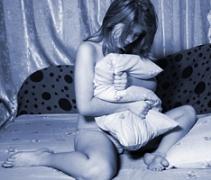Phoebe is a small-boned, slender, birdlike young woman in her mid-thirties; as she perches on the edge of the chair, her quick, wide smile and surprisingly deep voice belie her almost fragile appearance.
“There are just so many women who are so hurt in that place,” she continues, “and they are looking for answers, and (either) abandoning spirituality altogether, or just digging in further to what they (already) know. And I know what that’s like because I’ve been grappling with this kind of thing my whole life.”
Brought up in an extreme fundamentalist Christian household, Phoebe began early to identify her own femininity as sinful, and to reject it both emotionally and, what was in some ways even more dangerous, physically. Put simply, shame made her seriously ill.
The disease Phoebe was to develop in young adulthood had its roots in a culture of divine retribution. Her budding adolescent sexuality, in particular, plagued her with fear and shame.
“This was right in the middle of the ‘purity movement,’ and the kind of message we received is that every time you touch yourself, you’re nailing a nail into Jesus’s hands, or piercing his side. So you can imagine, as a 16-year-old girl who has sexual feelings, every time I even had a sexual thought I would literally burst into tears and sob in my bed, crying to God to save me from having sexual thoughts, because I was murdering the Jesus I was supposed to love. And that was my life every day– just living in fear and anger and regret and shame.”
The dual demands her church made on her — of sexual purity and feminine submission — exerted such force as to make Phoebe feel as though she were being “spiritually raped.”
“I know that’s an aggressive term,” she says, “but it really felt that way. So I really shut that whole part of myself off, emotionally. I just wanted nothing to do with being female.”
The word “psychosomatic” comes from the Greek words for “soul” and “body.” And just as Phoebe’s soul shut down against the onslaught of shame and scrutiny, so her body, too, armored itself against its own femaleness.
“I think physically that shut-off happened literally in my uterus, my ovaries–I just clamped down, so not to have any part of being female. And it ended up literally manifesting itself into an illness that has to do with my progesterone.”
In practice since 2007, Phoebe is a Holistic Therapist. Treating exclusively women and adolescent girls, she works with them in such areas as anger, anxiety, depression, grief, infertility, LGBTQ issues, marriage and relationship issues, parenting, self-esteem, sexuality, spirituality and sexual abuse. “Healing is a sacred process,” proclaims her website.
Phoebe got her start as a therapist early and informally, serving as a sort of wise-woman to her peers at her evangelical Christian university—peers who, it turned out, had had many of the same harrowing experiences she had growing up in a fundamentalist Christian household.
“Because I was so vocal about my feelings and the things I had been through, a lot of girls in my cohort started coming to me and asking the same questions. And as I was working through my own stuff, I realized that there was this huge need out there for someone who understood what it was like to be a woman and be oppressed in a spiritual space.”
Phoebe’s indoctrination began, in a way, before she was even born.
“My parents came into their marriage with a really intense fundamentalist background, so we ended up going to more and more extreme churches…(where) there were expectations on your every thought, breath, action—it was very cult-like.
“Unfortunately,” she continues, “it was very clear from the beginning that I was a free thinker, and that was a huge problem, because I asked questions.”
The answers dispensed in Phoebe’s church did not come in response to questions, but directly from the doctrinal and scriptural source that was, to the church’s way of thinking, divinely inspired, literally true, and not open to question.
“And I was constantly asking questions,” Phoebe says. “Like, what was the point of the Trinity, why does that make any sense? Just basic theological questions I think any person would be wise to ask. But that was never okay; the pastor got extremely defensive and start pushing back on me.”
“So at that point,” she says, “the attempts at saving my soul began. For the church, that looked like berating me and separating out from other people.
“And I just fell into anger. I became angrier and angrier and angrier.”
I Would Fly Away and Be at Rest (Psalm 55:6)
As the state of Phoebe’s soul became increasingly suspect, and as adolescence set in, the tension between the authoritarianism of her church and Phoebe’s questioning mind—and resultant “mouthiness”–intensified.
“(I developed) this constant fear that the punisher God was going to smite me at any moment–and I developed anger that I had to live with that on a daily basis. And it reached into every corner of my life; I felt like I couldn’t do anything about it without doing everything wrong.”
Because of Your Anger, There is No Health in My Body (Psalm 38:3)
The “purity movement” dates back to the 1980s and 90s, when the sexual revolution of the 60s and 70s fell apart in the face of the AIDS epidemic and the resurgence of conservative Christianity during the Reagan years.
“You have heard that it was said, ‘You shall not commit adultery,’” said Jesus in the Sermon on the Mount. “But I tell you that anyone who looks at a woman lustfully has already committed adultery with her in his heart.” (Matthew 5:27-28) Jesus’ insistence that outward observance of the Law was insufficient, and that a conversion of the heart is necessary, amounted, for the purity movement, to a declaration that “any sexual feelings, desires, or thoughts that occur before marriage are sinful.”[i]
This radical demand for sexual purity exacted a high price from the young women toward whom its message was primarily directed, and who bore the brunt of the responsibility for maintaining it. Besides policing their own sexual feelings, they were made to feel responsible for whatever lustful desires their bodies might stir up in teenaged boys. Because the girls’ feelings were perfectly appropriate developmentally, they could not succeed in excising them–though the effort often led to feelings of shame and fear, as well difficulty with sexuality and intimacy.[ii]
Phoebe would begin to learn how widespread this sexual malaise was among her peers when she entered the wider world of university life. [1] Though she began to interrogate her received faith with ever-increasing determination, she found it impossible to break out of the mold into which she’d been cast.
“I was able to start to grapple with some of the spiritual abuse that I had been through,” she explains, “but I continued to maintain, theologically and emotionally, a connection to the punisher God, and was just incapable of breaking free. It didn’t matter how many progressive books on theology I read, how many professors I talked to, how much I prayed— it had a vice grip around me.”
Her stint as a sounding board for her college peers ultimately led her to pursue a degree in counseling, and the practice of Holistic Therapy aimed at the whole person: mind, body and soul. Many women, Phoebe has observed, have tried to excise parts of themselves that are causing them pain and holding them back from experiencing a full, normal life and spiritual growth.
The Body Keeps the Score[2]
Autoimmune Progesterone Dermatitis, in which a woman’s body reacts adversely to her own progesterone, is very rare. In its more serious forms, it is called Autoimmune Progesterone Dermatitis and Anaphylaxis, which is extremely rare. Since 1921, there have been as few as fifty published cases of APD, of which as few as 9 attained the status of full-blown APDA.[iii]
APD often presents as some combination of eczema, skin lesions and hives, inflammation of the hair follicles, oral inflammation with ulcers or blisters, and skin edema.
Additional symptoms that may indicate anaphylaxis include fever, shortness of breath, vomiting, internal bleeding, and the accumulation of fluid in the peritoneal cavity or the chest cavity.
Both conditions are tested for by injecting progesterone under the skin. APD can often be treated topically, or with injected steroids or progesterone-suppressing hormones.[iv] (It has not been shown to respond to conventional treatments such as antihistamines.)[v] APDA can only be resolved with a hysterectomy and ovary removal.[vi]
In Phoebe’s case, the disease did not manifest in its full severity all at once.
“I had been getting sicker and sicker, and every time I would ovulate, seven days after I’d be covered in hives the size of a fist all over my body. And then I would lay in bed and waves of nausea would literally wake me out of a dead sleep. I would just have to get out of bed and throw up.
“APDA is incredibly rare,” she explains, “and so it took a long time to figure it out. But eventually we connected the dots that it was cyclical and we did a simple test. They inject progesterone under your skin. And within five minutes, I had hives racing down my arms and my hands, and I was wheezing. And that’s a clear diagnosis.”
Once they knew what they were dealing with, and that it carried the risk of a sudden, fatal flare-up, the doctors prescribed a syringe of emergency allergy-counteracting adrenaline called an Epi-pen.
“APDA can eventually stop your breathing because of the hives. It had fortunately never happened to me, but I had to carry the Epi-pen around just in case. Progesterone rises and falls, and it is pretty clear when it does, so I usually knew when I was in the danger zone. But sometimes it would just randomly surge and I would get hives all over the place.”
It seemed Phoebe’s unconscious mind had come to the defense of her femininity, protecting it from the onslaught it endured at her church even at the expense of causing a dangerous illness—a sort of scorched earth gambit in which the territory under attack was damaged so as to keep it out of the enemy’s hands. And the unconscious knew exactly where to work its sabotage: on the hormone that controls much of her body’s expression of its femaleness.
“Progesterone is what makes breasts grow,” Phoebe says, her smile breaking through at the irony of it all. “It’s what gives you cycles, and it’s what helps babies grow, and I literally became allergic to it. I shut myself off from my own pain and shame and suffering, and it came back as this physical manifestation, in my body.”
During her time as a dormroom doyenne, Phoebe heard from many of her friends about the problems with sex and intimacy they had acquired as a result of purity-oriented teaching.
“I had this discussion with almost every one of my friends who grew up Christian, and not one of has had an easy transition into being able to just be sexual. To this day they all still struggle with that with their partners.
“It had effects on my marriage big-time, because I went into a marriage having all of these problems with my body and my sexuality, and then I was supposed to suddenly be sexual! And it’s stuff I am still sorting through my husband.”
I Know There is Freedom
Phoebe has not allowed her experiences to shut her off from her thirst for knowledge, or her search for an authentic spirituality.
“Spirituality is always at my heart, and I know that there’s this place internally that’s free of all of the shit that’s been heaped on it. I know–I know–that there is freedom and I never, ever stop searching for it.”


 Share on bsky
Share on bsky





Read 0 comments and reply